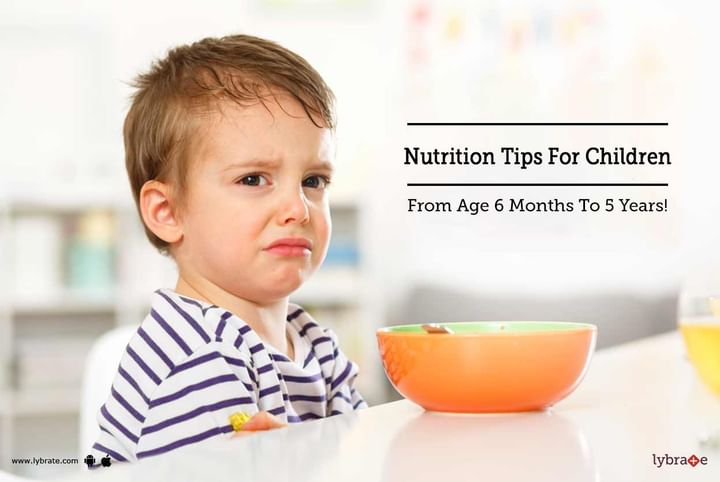Nutrition Tips For Children From Age 6 Months To 5 Years!
Child nutrition from age 6 months to 5 years growth and development of a child depends on the nourishment received by the child right from birth. Healthy diet and proper eating habits are essential to be inculcated in a child as early as possible. A balanced diet given to the child at the earliest provides all nutrients required for adequate growth and development. Nutritional value of every food item introduced in the child’s diet should be gauged prior and then given to the child.
Nutritional requirement of children varies in accordance to the age group. It is necessary that the parents should have knowledge about the age-specific requirements of the diet, which will benefit the child in their growing years.
Following is the ideal child nutrition ranging from the age group of 6 months to 5 years.
1. 6 months to 12 months
A. Right from the birth of a newborn child, it is necessary to begin breastfeeding for the baby. It should begin within an hour of the child’s birth. It is the ideal way of providing proper nutrition to the child.
B. Breastfeeding is beneficial by providing nourishment and also by improving the immunity of the baby.
C. From birth to 6 months, only breastfeeding is advised. It is a critical source of nutrition for the child even during illness.
D. After the baby turns 6 months old, solid food can be introduced in the child’s diet.
E. Breastfeeding can be continued and supplemented with other food items.
F. Usually, fruit juices are introduced first in the diet.
G. Feeding bottle should be avoided and the child should be fed with a spoon and cup. Proper hygiene and good handling of the food is required.
H. It is necessary to wipe the gums and developing teeth clean with a wet gauge to prevent any decay that can be caused by sticking of the food on the teeth surfaces fed to the child.
2. 1 year to 3 years
A. Children in this age group can tell when they feel full after feeding. It is necessary to listen to their demand for food and also avoid overfeeding children.
B. This age group requires children to eat all types of nutrients, so parents should focus on providing a variety of food items to replenish their child’s nutritional requirements.
C. Children in this age group require fat-rich foods and should be given dairy products for calcium requirements.
D. Processed foods should not be given to children in this age. Calories intake should be monitored to the optimum level.
E. Since children at this age are involved in activities like walking, running around and playing it is essential to keep feeding them at regular intervals to maintain the energy levels of their bodies.
3. 3 years to 5 years.
A. Children belonging to this age group require to eat a well-balanced, nutrient rich diet.
B. Grains should be included on a routine basis. They provide the child with carbohydrates, fibers and minerals. All these nutrients provide energy to the child’s body.
C. Inclusion of whole wheat grains provides fibers in adequate quantity.
D. Refined foods should be avoided, whole grain breads should be included in the diet.
E. Fruit intake should be increased, as they are an important source of various vitamins. Fresh fruit should always be preferred over juices for growing children.
F. Sugar intake should be kept to a minimum quantity, since refined sugars do more harm to the child’s health than any good.
G. Vegetables should form a considerably greater part of the child’s daily diet, with the inclusion of a variety of vegetables.
H. Protein sources of food include meat, poultry, pulses, beans and nuts. Along with protein, these food items also provide iron, zinc and minerals to the body.
Apart from the above specified food items, daily intake of milk is necessary for children of growing age. It provides the body with sufficient calcium to facilitate bone growth in growing children. Also, nuts like walnuts, almonds, cashews are advised to be given to the children daily.



+1.svg)
